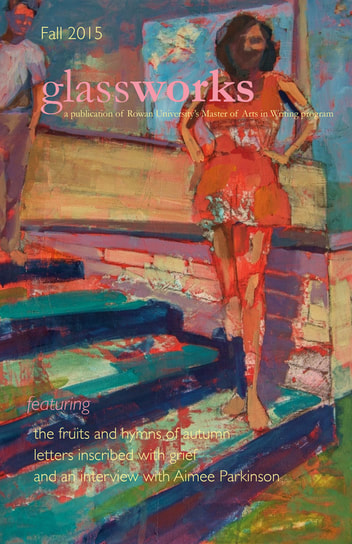|
lookingglass
Through the "Looking Glass," readers are invited to dig deeper into our issues as contributors share reflections on their work. Specifically, "Looking Glass" provides a sort of parlor where authors and artists reveal the genesis of their pieces, as well as provide meta-discursive insight into their textual and visual creative works. Issue 11 Reflections
Read on for reflections by select authors and artists
on the genesis and craft of their pieces in Glassworks and then read the full issue online! |
Rage Hezekiah
"Firefly"
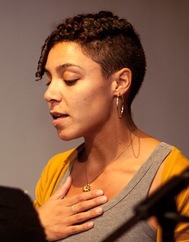
I'm a reluctant city-dweller, and when I have the chance to retreat to the woods, I'm so grateful for the way my body slows. I was staying in a lakeside cabin in New Hampshire when I wrote this poem. Many of my poems originate from the stories of others, experiences where I'm not a direct witness. My partner, Jessica, told me about watching a firefly trapped in a spider web, and I found the image particularly striking. One of my biggest challenges with writing poetry is that I'm often heavy-handed with musicality. When I wrote this poem, I was reading Robert Pinsky's anthology Singing School and swooning over the pleasure of reading the poems aloud to myself in the woods. Looking back, I see the ways that reading formal poetry influenced my sound.
Susanna Lang
"Letters, No Address"
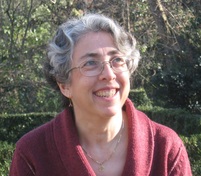
I wrote “Letters, No Address” in the winter of 2013-2014,
when the polar vortex had turned Chicago into an obstacle course of bitter
cold, snow and ice that was almost impossible to navigate—for what seemed an
endless period of time. I couldn’t stop writing
about the weather, banal as that subject usually is. Weather weighed us down, interrupted our
daily routines and took over all our conversations.
Somewhere in that time, my mother mailed me some epistolary poems by John Donne, a poet I loved as a teenager and hadn’t read much since. One of the poems, addressed to Mr. R. W., talked about how his friend’s letter brought him back to life—and suddenly I had a form for some material I had wanted to use but hadn’t found a way into. I wrote a series of very short epistles, verse postcards, addressed to winter itself as well as to John Donne, a local jazz musician, and the eagles that had moved south to find open water where they could fish. I had another to Langston Hughes that I cut, as it didn’t seem to fit the series.
They are letters without an address, because I didn’t have John Donne’s faith that my words could reach someone and bring the recipient back to life. It felt at that time as if language itself were frozen in the ice of Lake Michigan.
Somewhere in that time, my mother mailed me some epistolary poems by John Donne, a poet I loved as a teenager and hadn’t read much since. One of the poems, addressed to Mr. R. W., talked about how his friend’s letter brought him back to life—and suddenly I had a form for some material I had wanted to use but hadn’t found a way into. I wrote a series of very short epistles, verse postcards, addressed to winter itself as well as to John Donne, a local jazz musician, and the eagles that had moved south to find open water where they could fish. I had another to Langston Hughes that I cut, as it didn’t seem to fit the series.
They are letters without an address, because I didn’t have John Donne’s faith that my words could reach someone and bring the recipient back to life. It felt at that time as if language itself were frozen in the ice of Lake Michigan.
Claudia Putnam
"She who was able to embrace the eagle..."
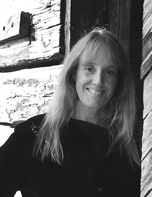 photo by: Heather Hummel
photo by: Heather Hummel
Years ago my nurse practitioner told me a story very much like this one. She said, “I’ve been waiting months for you to come in, because I knew you would understand.” I was shocked by the story and shocked also that she knew that I was the receptacle for it. How did she know? I’d only been to see her twice, and mostly we’d talked about what a jerk I was married to then. And yet it was true; I was the person who should hear about that eagle. For years I carried these images around, along with many more that are not in this poem. When she told the story, I felt as if I were in her skin as it happened. I was also familiar, personally, with the place where it happened. I knew the pass, I knew how the air smelled there, what the light might have been like. She described the sadness of the eagle, not at dying, at being grounded. I was interested in the merging of all our experiences and consciousnesses. Mine with hers, hers with the eagle’s. I wrote the poem over and over, but only recently got it close to right.
Tina Tocco
|
|
|
There's a park a block away from my home that fills in the evenings with boys outfitted in little league uniforms, some of them in equipment so small it's hard to imagine the manufacturers make their size. Whenever I hear a coach or dad bark a little too loudly ("Look alive, Aiden!" "Caleb, what are you doing? Keep your eye on it!"), I always imagine the man is revealing his life's biggest frustration - a glorious, mega-million dollar, pro-sports dream that dwindled into a suit-and-tie job like everyone else around him. Obviously, this isn't always the case, but the idea of parents living vicariously through their kids can be very real and detrimental.
Then a few years back, I saw the video of "Boys of Fall," a country music song by Kenny Chesney. It illustrates in a deeply positive way the big deal that small-town football can be. But the video made me think some more about fathers pushing their sons and the reasons why - sometimes living out their wrecked dreams through a younger self, but higher motives, too, like a way out and into something better. |
I probably shouldn't admit this, but I forgot about "Gone" for something like nine years. I'm not exactly sure when I began writing it - maybe 2005, after I'd taken my first master's level poetry class. A fiction writer terrified of poetry, I really took to form poetry in that class, so stringing together haiku would have seemed natural (though I remember altering the line breaks repeatedly, not sure if the stanzas should be haiku or not). Unfortunately, I couldn't figure out an ending and left it for awhile.
I guess "awhile" turned into nearly a decade because I didn't see "Gone" again until 2014. By sheer dumb luck, I came across it as I was cleaning out some old files, right around the same time I discovered a journal was running a Japanese poetry issue. I told myself this was destiny, and worked on the poem every day until it was finished. For some reason I can't recall, I sent it to Glassworks first, even though I was so keyed up about this Japanese poetry issue and had never submitted anything to Glassworks before. Right after I received my Glassworks acceptance, the other journal rejected it. I really owe them a thank you, though - if it hadn't been for them, I might never have finished "Gone." |
Mark Lee Webb
"Salvation"
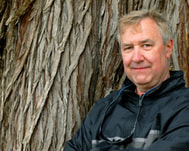
My poetry tends to slide down an idiosyncratic path of inconsistency. “Salvation” was written one afternoon while an exterminator was on our roof trying to determine what kind of bugs were crawling in and out our fireplace and chimney. The worst they could be were termites. I thought—you know, termites are certainly not as bad as tumors. Suddenly I had a poem sliding down a path of rapid associations with religion, trees, snakes, and worst-case scenarios. The exterminator found flying ants, and brought me a baggie full of non-invasive bugs as proof. His diagnosis was benign, not terminal. He left, and I had a new poem and no termites.

